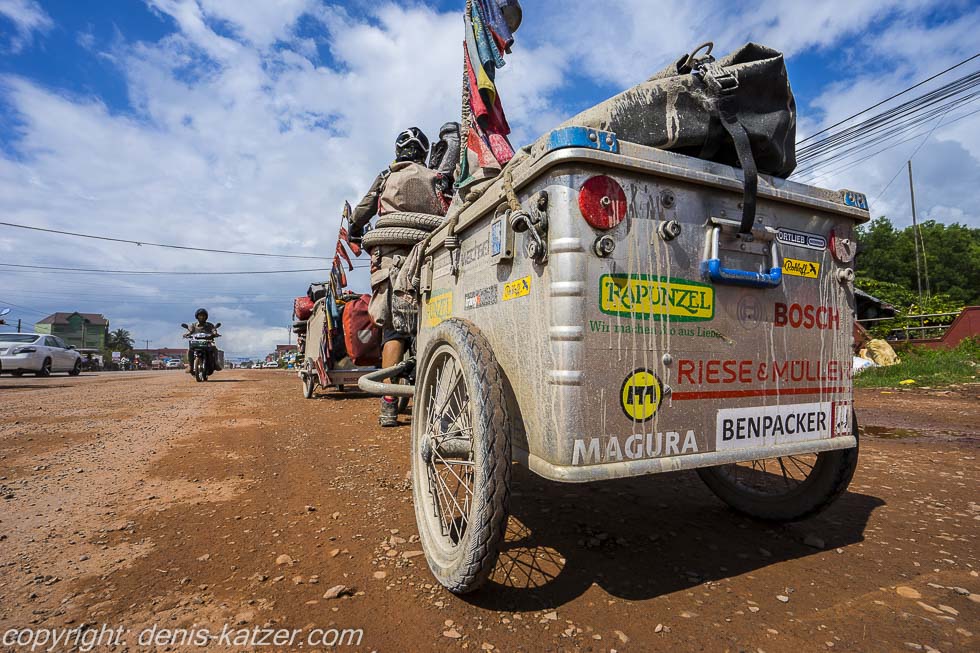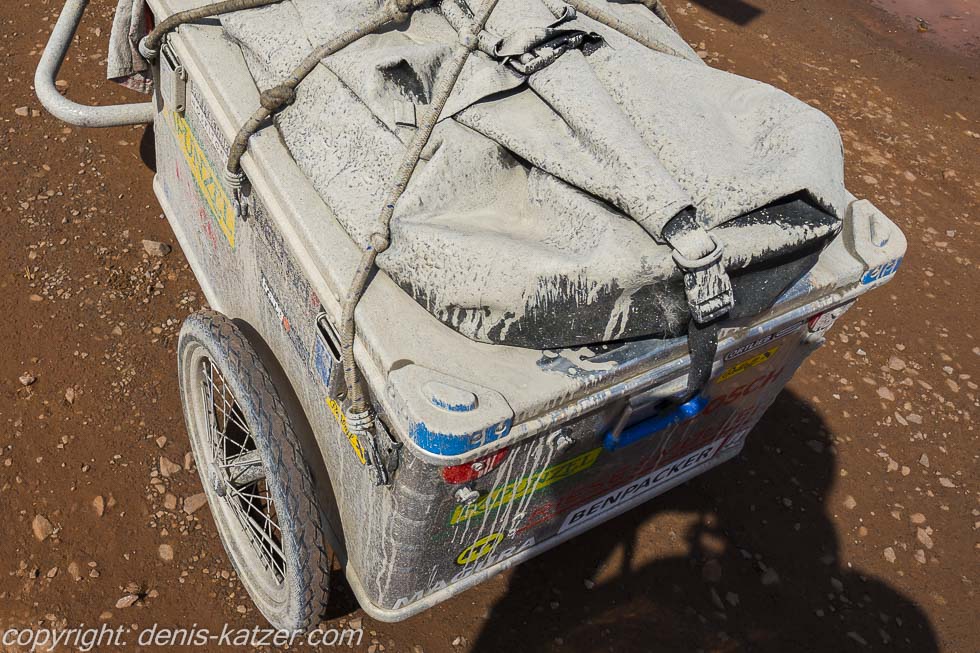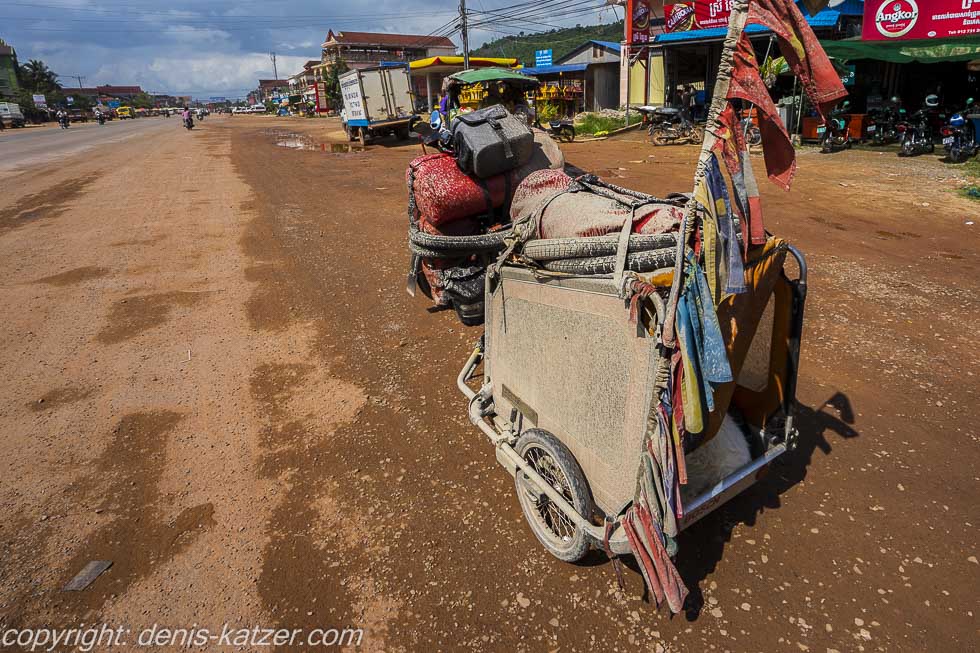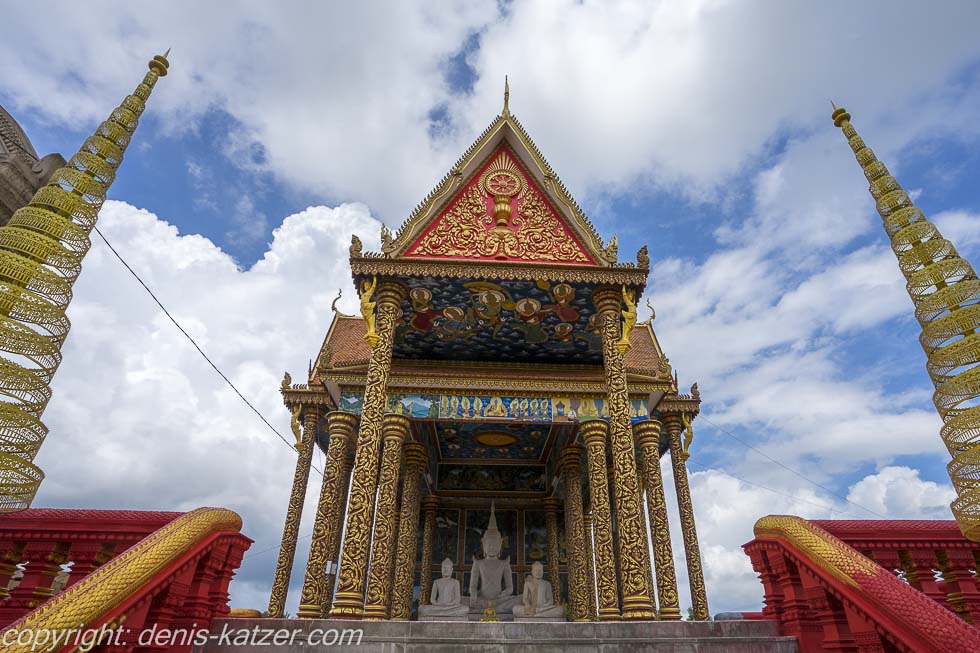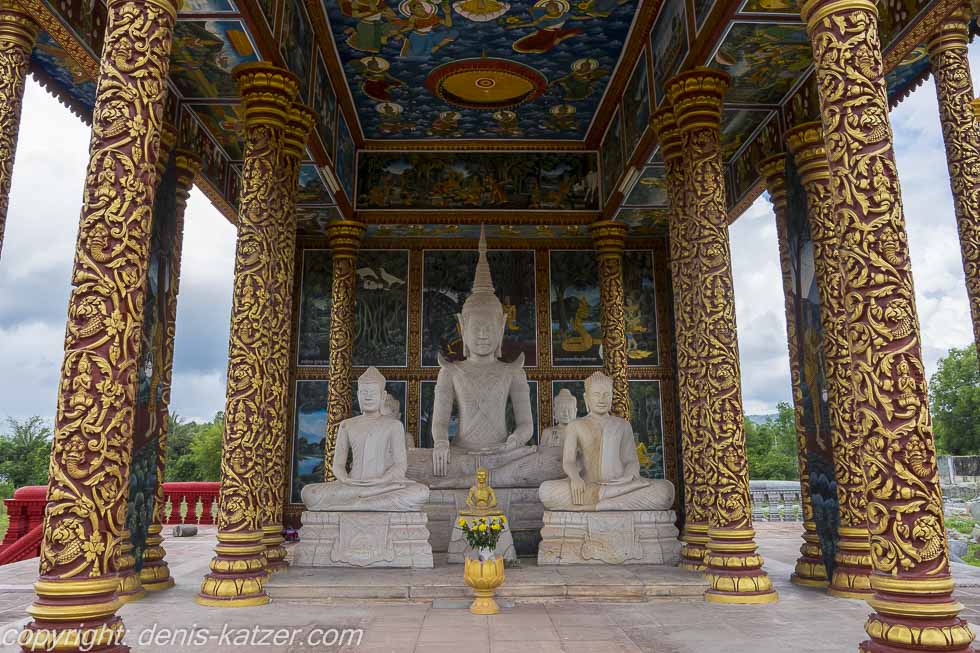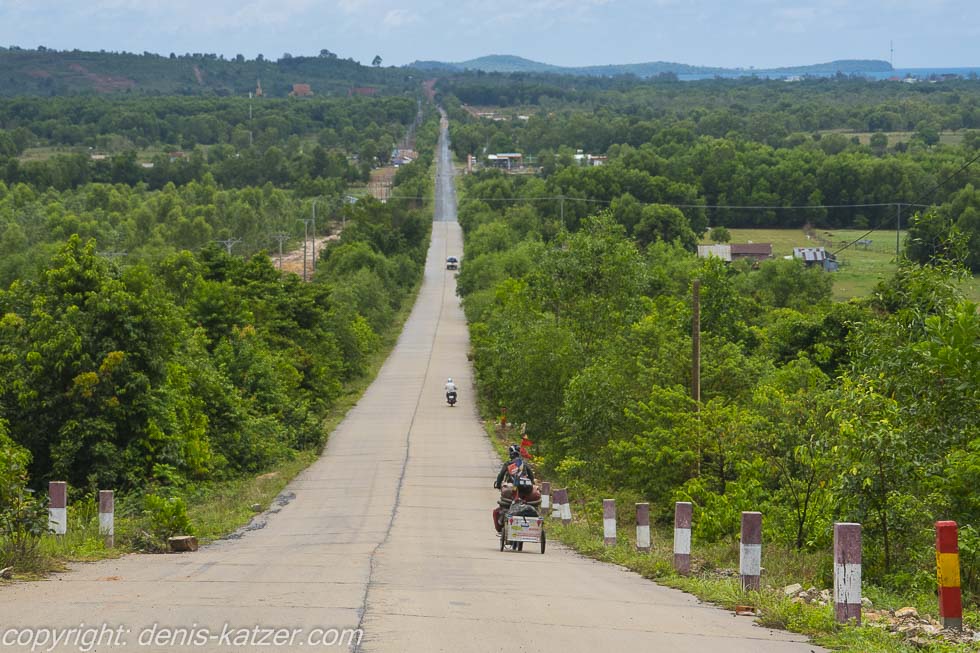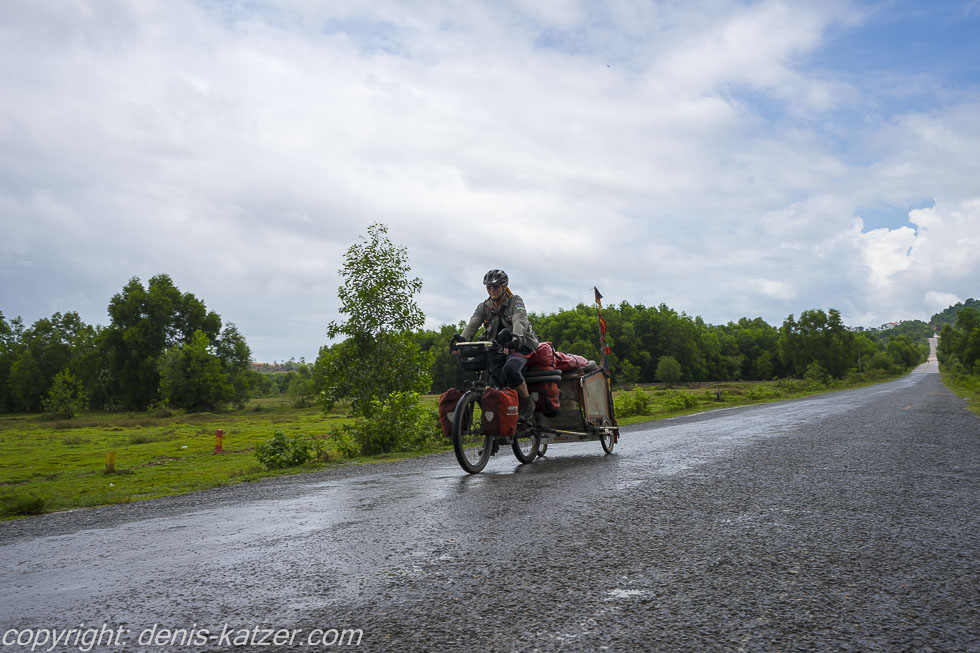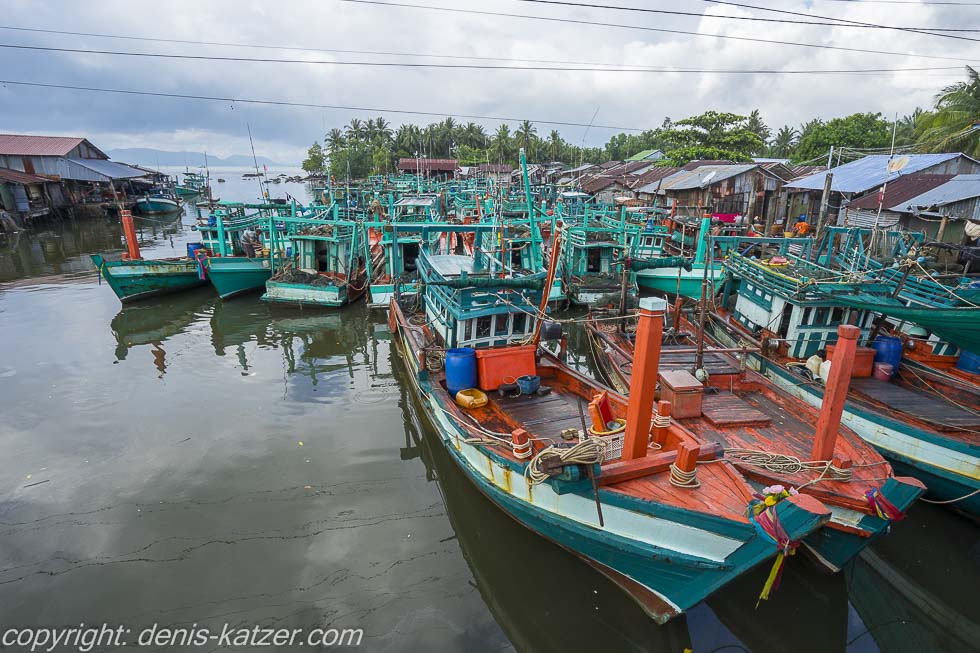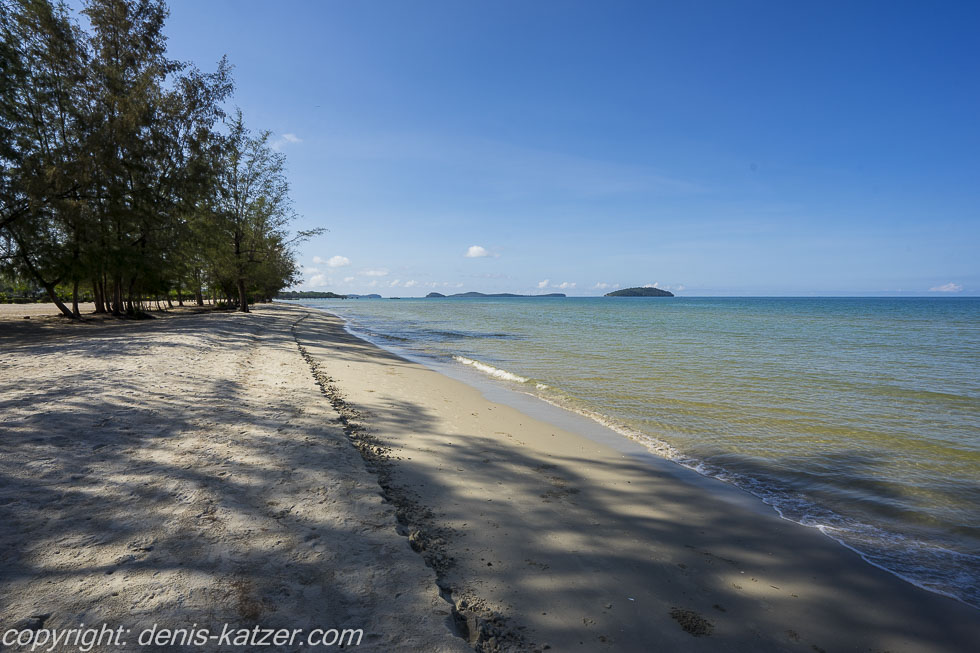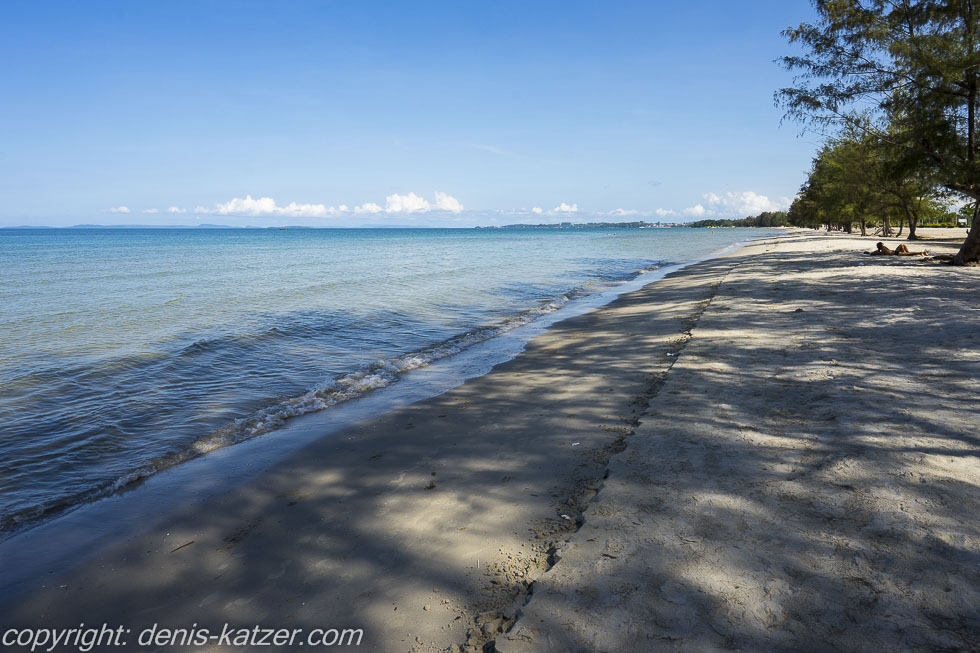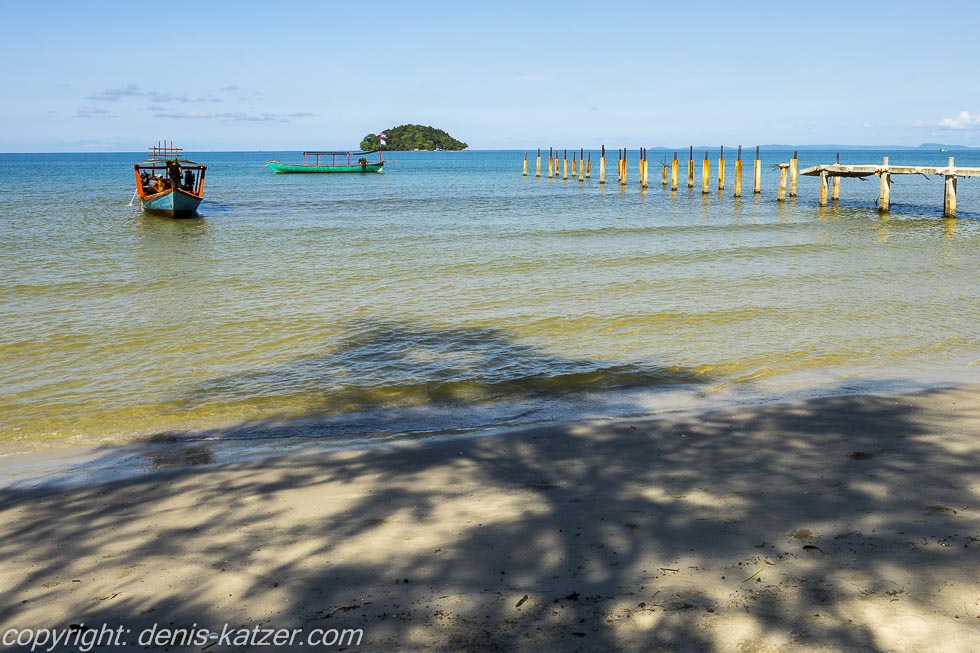
Sweating 106 kilometers – Aggressive Frenchman
N 10°34'16.7'' E 103°33'11.0''
Date:
10.04.2017 until 11.04.2017
Day: 650 651
Country:
Cambodia
Province
Sihanoukville
Location:
Terraced hut complex
Latitude N:
10°34’16.7”
Longitude E:
103°33’11.0”
Daily kilometers:
106 km
Total kilometers:
23,499 km
As the crow flies:
68 km
Average speed:
23.0 km/h
Maximum speed:
45.5 km/h
Travel time:
4:36 hrs.
Soil condition:
Asphalt / gravel
Maximum height:
120 m
Total altitude meters:
70.836 m
Altitude meters for the day:
265
Sunrise:
05:58 a.m. – 05:57 a.m.
Sunset:
6:16 pm
Temperature day max:
38°C
Departure:
07:00 a.m.
Arrival time:
12:30 p.m.
(Photos of the diary entry can be found at the end of the text).
We are already in the saddle at 7:00 in the morning and leave Kampot behind us. Above our heads, dark storm clouds move across the land. It’s extremely humid again with around 98% humidity. Even the first rays of sunlight, which occasionally peak through the cloud fronts, hit us like glowing arrows. A heavy tropical shower soaks us to the skin. Nevertheless, we hardly feel any cooling. It doesn’t take long and our clothes are dried again by the sun and the wind. Although it never really gets dry because of the constant flow of sweat. The roads are steaming and we feel like we’re cycling on the bottom of a cooking pot hanging over the flames of a campfire. There is no doubt that cycling in sub-zero temperatures and with the right protective clothing is decidedly more pleasant than in this horrible, humid heat. To our displeasure, the asphalt is replaced by a red-colored gravel and dirt road that dries in the sun. The dirt swirled up by the tires makes us look like we’ve taken a mud bath after just a few hundred meters. Our e-bikes are covered over and over with the earth’s crust. After more than 10 kilometers the construction site is finished, then a potholed tar strip gives us easier progress until it is replaced again by a dirt road. For a change, the surface is almost white this time, which is why our bikes and saddlebags adapt to the new color like a chameleon. We stop at a crossroads for a few minutes to catch our breath. A car stops next to us. The driver rolls down the window and hands us two bottles of water and two small bottles of Red Bull. “Thank you so much!” I say, surprised at the extremely kind gesture and accept the refreshment. The driver nods his head, smiles and drives off. Although we fundamentally dislike the chemical-tasting Red Bull, we still down our throats after the cold water. “Boo-hoo! Nasty stuff,” I say, shaking myself. In fact, it gives us a brief energy boost. Because we don’t want to get caught in the midday heat, we speed along the mostly flat route at an average speed of 23 km/h without taking long breaks. “How much further?” asks Tanja. “About 40 kilometers!” I reply. Then the blue sea peeps through the green bushes. We step on the gas and let the cranks spin like there’s no tomorrow. It’s getting hotter and hotter. The temperature is likely to be just under 40 degrees in the shade. Then it goes slightly uphill. “Shouldn’t we turn left here!” calls Tanja. Reluctantly, I pull the brakes. Any interruption is unwelcome for me, as I want to cover today’s hundred kilometers as quickly as possible. I look at my GPS and check the coordinates. “That’s right, we have to get off the main road,” I say and am now glad to have been pulled out of my rut by Tanja.
A long concrete strip leads back down towards the Gulf of Thailand. My concentration is now completely depleted by the heat, simply no longer there. This is a good reason to be particularly careful not to make any driving mistakes. My aching shoulder is whimpering to me right now about what this can do.
It is 12:30 pm. After almost 100 kilometers we reach Otres Beach. We travel very slowly along an unpaved clay road with endless holes. Guest houses and hotels are lined up to our left and right. Restaurants and stalls mingle in between. We landed on a very busy tourist beach. Some of the travelers from all over the world look at us in bewilderment, obviously unable to believe their eyes. Our bikes, heavily laden with red bags and each towing a trailer, bump past. When they see Ajaci in my trailer, some laugh, others call out to their friends to point out the circus-like performance. Some pull out their camera or smartphone.
“There it is!” I shout happily as I discover the French-run Pat Pat guesthouse, which we had already looked at on a booking portal. “At the moment we have a special price of US$ 25 including breakfast,” says a young South African who works at reception. “Can I see the room?” I ask. “Sure,” he replies in a friendly manner. Because we want to rest here for a few weeks from the stresses and strains of recent times, and the room is quite dark, I decline. The larger, brighter rooms cost US$ 45. “The larger room is nice. If we can agree on the price, we’ll stay,” I try to negotiate. The South African asks his patroness. As the New Year celebrations are coming soon and the rooms can be rented out for US$ 90 during the holidays, we have no chance of negotiating a better price. We say goodbye and decide to eat a pizza in an Italian beach restaurant. Here, too, there is a great deal of excitement when we park our bikes on the beach and a large white wolf sits down next to the table. Although we are dog-tired, we answer many of the tourists’ questions. “I’ll go back to the Frenchman and tell him I want to stay for at least 10 days. Maybe he’ll give us a special price after all,” I decide and set off, my limbs heavy with lead. This time I talk to the 60-year-old owner in person. We have a gym, a swimming pool and breakfast is included in the room rate. There’s nothing more to negotiate,” I understand the Frenchman, who barely speaks any English. Disappointed, I shuffle back to the Italian restaurant. Meanwhile, the food is there. I am ravenously hungry and tuck into the delicious pizza. Although we feel like we can’t move another meter after dinner, we set off again to find affordable accommodation for the next few days. We drive up and down the beach for 1 ½ hours until we know every accommodation option. Some of them are already fully booked due to the upcoming holidays, others are outrageously expensive or simply indisputably bad. “Let’s go to the Pat-Pat again. Maybe the 25 dollar rooms aren’t so bad after all,” Tanja suggests. “Okay, I think you’re right,” I say and roll my bike with the last of my strength over the surface, which is boiling with heat.
“There you are again,” says the South African happily. “Is the special price of US$ 25 still valid?” I ask. “Sure,” he replies and leads me to the room again. Actually not so bad, I think to myself. Tanja and I decide to stay. “Can we park our bikes next to the hut?” I ask. “Sure, no problem. “We also cover it with a green tarpaulin. Then it looks good and none of the guests will mind,” says Tanja. “Ha, ha, ha. Sure. Like I said, no problem.” “Can we spray our dirty bags with the water hose before we carry them into the room?” asks Tanja, pointing to the plastic snake lying on the lawn. “But yes, do that,” he says. As there is no shade in front of our small hut, we unload our equipment in the sun at almost 60 degrees. The thought of soon being able to enjoy a cooling shower and retreat to the shade of the room gives us wings. While I carry the first items of equipment into the room, Tanja is spraying the bags with the hose. Suddenly we hear loud clamoring from the reception. The South African hurries up. “Um, my patroness doesn’t want you to hose down your pockets here. She says that the strong sunlight will burn the grass. Sorry for the inconvenience.” “No problem. We understand that. Then we’ll take the bags to the shower in the room and clean them there,” says Tanja kindly. “Thank you very much,” replies the South African, visibly relieved that we didn’t take offense at his boss’s shouting. We carry all the bags into the room. Meanwhile, I have the feeling I’m about to suffer a heat stroke. More or less hyperventilating, I’m just about to roll the bikes next to the hut when there’s another unpleasant roar. It only takes seconds and the South African comes rushing over. “Sorry, my boss doesn’t want you to park the bikes next to the hut.” “What? Then where are they supposed to go?” I ask as the 60-year-old Frenchman storms over and orders me in an unmistakable tone to park the e-bikes at the end of the facility next to the outside fence. “But it’s very easy to steal them there.” “There are cameras there. Nobody steals anything there!” he grumbles at me unkindly. “Our bikes are extremely expensive. We can’t possibly leave them next to the fence by the road overnight,” I try to explain as he storms off again without listening to me. The South African stands sheepishly in front of me and shrugs his shoulders. “You said you could park the bikes next to the hut, right?” I say. “Yes, but my boss has decided otherwise. What am I supposed to do?” Tanja and I are standing there, dumbfounded, discussing what we should do now. “Whenever you get tired, you often make the wrong decisions,” I reflect thoughtfully. “That’s right. Wouldn’t be a good idea to leave the bikes over there. Especially as we know that security guards like to sleep at night,” Tanja agrees. Just a few moments later, the South African sneaks up again. “What’s the news now?” I ask. “Um, the price for the room is without breakfast.” “Isn’t it? I don’t believe that now. You promised us the special price several times.” “Yes, but my boss changed the price and canceled breakfast.” “Well, that’s never happened to us before. What would you say if you were treated like that as a guest?” Tanja asks him. “I’m really very sorry. I’m only employed here, I only get free board and lodging for my work and I don’t earn more than US$5 a day. So I can extend my travel time a little. My boss is indeed a very rude person. I think I’ll quit here and never work for the French again.” “Phew, that’s really awesome. Okay, you’re not to blame, but under these circumstances we’ll pack up and leave,” I decide in consultation with Tanja.
An hour later, our bikes are loaded up again. We have just pushed them out of the facility when the Frenchman runs after us and shouts: “Thank you for using the shower and making the room dirty!” When the words land in my ears, I see red and put my bike on the stand to give this asshole a piece of my mind. I don’t get far before both of Tanja’s hands are clutching my shirt. “If you go to that idiot, I’ll be pissed off. You stay here. You know that won’t end well. He’s lived here for a long time and certainly knows a few corrupt policemen. If that moron hits you and you fight back, we’ll have a bigger problem. We’re leaving! Immediately!” her words penetrate my pulsating consciousness. “Can I let you go?” “Yes,” I answer reluctantly, get on my bike like a humiliated and beaten dog and cycle off across the red clay soil.
As we all agree that we don’t want to stay on this beach, we leave it and take the narrow asphalt road about 200 meters from the sandy beach. It is now 5:30 pm. At the side of the road we find a simple complex with a few unkempt huts. This time we are greeted by a Russian. “Sorry, but we’re fully booked,” he apologizes. A kilometer down the road we discover another plant, partly under construction. Tiny little huts stand side by side like terraced houses. In front of each of these tiny huts there is a small, unkempt terrace of two square meters overlooking the street. Some Cambodians shovel sand from left to right in front of the huts. Because of the heat, their movements are like in slow motion. Since it doesn’t matter now I ask if one of the uglies is free. “Yes sir, it’s only 23 US$ per night with breakfast.” “And you really think we should stay here?” I ask Tanja indecisively. “Where else do we want to go? It’s all full. Besides, you know very well that these are the situations in which you make mistakes due to lack of strength, possibly fall and injure yourself badly.” “That’s right, I can barely keep my handlebars straight.” “So what are you still thinking about?” “Okay, let’s make an emergency stop here. At least it’s a roof over our heads and they seem to have a beer here too,” I reply.
Surprisingly, the small room is not as bad as expected. The AC works, the wifi is good and the owners of the terraced cottage estate are very friendly.
The next day I ask if we can get a better price for a longer stay. The emerging festival is also used as an argument here. Although we still have yesterday’s violent act in our bones, we set off to explore the beach about 200 meters away. In this area it is lonely, there are no hotels, bars or restaurants. We decide to walk in the opposite direction, away from the evil Frenchman. “It’s beautiful here,” Tanja enthuses. “Indeed it is. Looks like paradise. However, our place up there by the road isn’t exactly a hit.” We follow the beach for about a kilometer, when suddenly bars and restaurants appear again. “Let’s go all the way to the end. Maybe we’ll find a better place,” I suggest. The result of our research is not encouraging. Here, too, either everything is fully booked or the rooms cost US$ 120 or even US$ 180 per night. “Maybe the beach doesn’t want us?” “What do you mean?” I ask Tanja. “Well, up there the Frenchman treated us like we were criminals and here at the end of the beach everything is fully booked or they have prices that only high-earning package tourists can afford.” “You mean we should skip the break on the beach and head back inland?” “I don’t know, but it’s not exactly great here.” “Let’s check the room situation again tomorrow. Then we’ll be a bit more rested. Maybe we’ll find a nice place for us after all.”…
If you would like to find out more about our adventures, you can find our books under this link.
The live coverage is supported by the companies Gesat GmbH: www.gesat.com and roda computer GmbH http://roda-computer.com/ The satellite telephone Explorer 300 from Gesat and the rugged notebook Pegasus RP9 from Roda are the pillars of the transmission.
